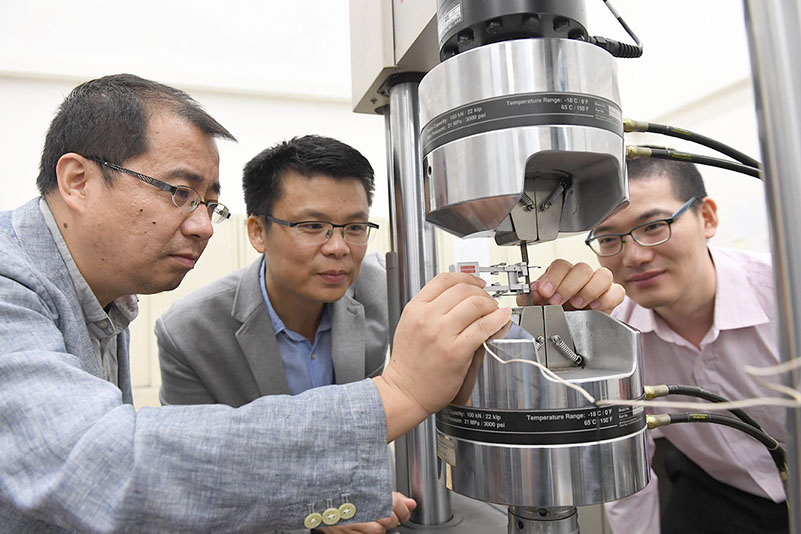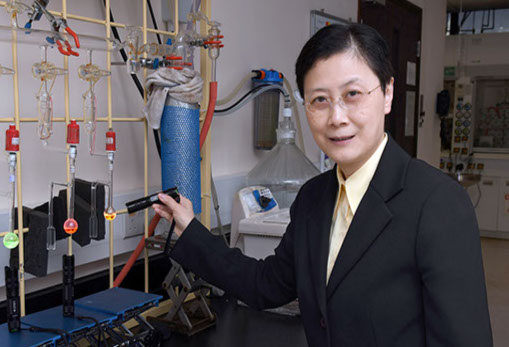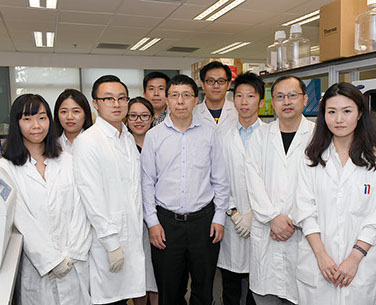Vision and Mission
Message from the
President and
Vice-Chancellor
Teaching and Learning
Research and Innovation
Knowledge Exchange and
Technology Transfer
The University Profile
An Extract from
the University’s
Annual Accounts 2016-17
Officers of the University
The Court
Vision and Mission
Message from the
President and
Vice-Chancellor
Teaching and Learning
Research and Innovation
Knowledge Exchange and
Technology Transfer
The University Profile
An Extract from
the University’s
Annual Accounts 2016-17
Officers of the University
The Court

The Review 2017

PDF Version
Past Issues
E-Book
RESEARCH AND INNOVATION
FROM INNOVATION TO APPLICATION
HKU scholars published 5,777 peer-reviewed publications in 2015–16 (the most recent year for figures) and have broken ground across a range of fields, as the examples below suggest. Their work is attracting interest from industries keen to help translate our findings into applications.

From left: Dr Luo Haiwen, Dr Huang Mingxin and Dr He Binbin developed a super steel.
Steeled for Success
A team of scientists from Hong Kong, Taiwan and Beijing, led by Dr Huang Mingxin of HKU’s Department of Mechanical Engineering, has developed a breakthrough ‘Super Steel’ that is stronger than conventional steel used in automotive, aerospace and defence applications, but still flexible and affordable, and can be produced using conventional industrial processing techniques. The findings were published in Science. Dr Huang also recently worked with Baosteel, one of the largest steel providers in the world, and General Motors to produce light-weight steel specifically for automobiles.

OLED Venture
HKU and TCL Corporation Ltd have signed a strategic collaboration agreement that includes an injection of funding for joint research on OLED display technology, led by Professor Vivian Yam Wing-wah, the Philip Wong Wilson Wong Professor in Chemistry and Energy. The venture will combine HKU’s expertise in developing new OLED materials with TCL’s leadership in the display industry, and it will explore the possibility of preparing inks for printable OLEDs for commercialisation.
Professor Vivian Yam Wing-wah leads research on OLED display technology.
Faster Detection of Disease
Biomarkers that can detect diabetes and cardiovascular, kidney and autoimmune diseases at very early stages have been developed in research led by Professor Xu Aimin of the Li Ka Shing Faculty of Medicine, who is also Director of the State Key Laboratory of Pharmaceutical Biotechnology. Several of the biomarkers have undergone successful clinical trials in Hong Kong, Mainland China and Australia and been patented.
Meanwhile, another HKU-patented technology from the Department of Biochemistry, called ‘flow-through hybridisation’, has been licensed to Guangdong Hybribio Biotech Co Ltd, which has used it to develop diagnostic kits for human papillomavirus that are used around the world. Hybribio successfully listed on the Growth Enterprise Market of the Shenzhen Stock Exchange in April 2017.

The development team led by Professor Xu Aimin (centre).